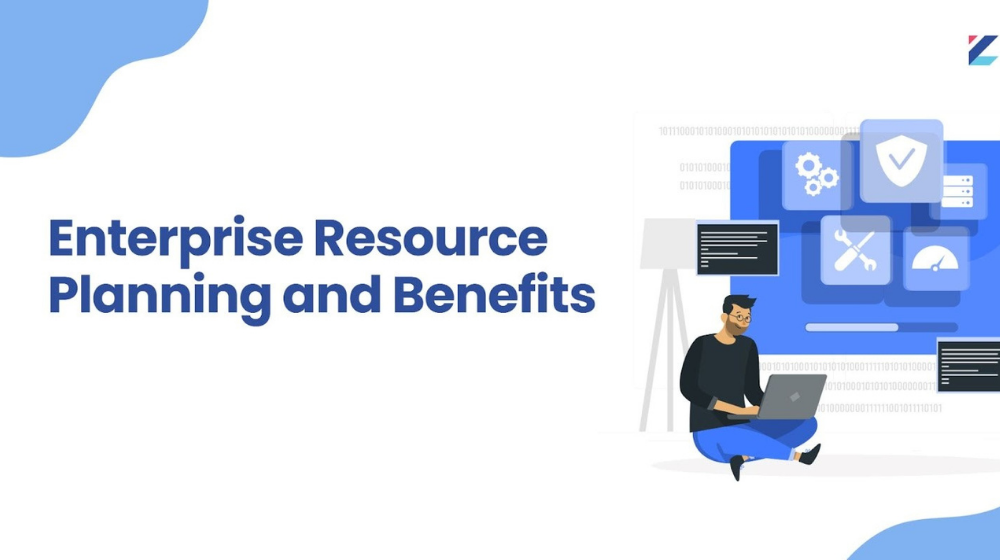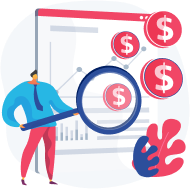64% of companies are planning to implement ERP within the next three years.
The adoption of ERP software is gaining momentum globally among businesses. This trend is driven by ERP’s numerous advantages, including enhanced efficiency and productivity.
Enterprise Resource Planning (ERP) software is a powerful tool that integrates various business processes into a single, cohesive system, streamlining operations and enhancing efficiency.
In this blog, you are going to learn about ERP software and the benefits of using it. To understand this, let’s first see what ERP software is and what its role is in modern business.
ERP Software: An Ultimate Guide for Understanding
What is ERP – Enterprise Resource Planning?
ERP (Enterprise Resource Planning) software integrates diverse business operations and departments into one system. It simplifies processes, ensuring seamless data management across finance, HR, supply chain, and customer management.
This data centralization minimizes duplication and enhances data precision, supporting effective decision-making and operational effectiveness. The software is crucial for streamlining complex business tasks and boosting organizational productivity.
Role of ERP in Modern Businesses
ERP software plays a crucial role in modern businesses, serving as the backbone for managing various core operations. Here are some critical roles of ERP Software in modern businesses:
- Integrates diverse business processes into a unified system.
- Facilitates seamless data flow across departments.
- Improves communication and operational efficiency.
- Offers real-time insights and analytics for informed decision-making.
- Adapts swiftly to market changes.
- Reduces operating costs and drives business growth.
But there is more to understanding how different types of ERP systems work. So, let’s explore three primary kinds of ERP Systems.
Various types of ERP systems: on-premise, cloud-based, and hybrid
ERP systems are available in various models, each distinct in its characteristics and advantages. The main categories include on-premise, cloud-based, and hybrid systems:
- On-Premise ERP:
- What it is: This ERP system is set up and operated from a company’s physical facilities, utilizing its servers, and maintained by its internal IT team.
- Advantages: It provides more control over the system and the data, offers better security, and allows deep customization.
- Limitations: The initial investment for equipment and software is higher, requires continuous maintenance and dedicated IT personnel, and may face scaling and ease of access issues.
- Cloud-Based ERP:
- What it is: Cloud-based ERP systems are hosted on the service provider’s servers and accessed over the Internet.
- Advantages: These systems typically have lower initial costs, eliminate the need for physical infrastructure, are easily scalable, and can be accessed from anywhere with an internet connection. This solves manufacturing problems too.
- Limitations: They involve ongoing subscription fees, depend on the provider for data security, and might offer limited customization compared to on-premise systems.
- Hybrid ERP:
- What it is: Hybrid ERP systems blend elements of both on-premise and cloud-based solutions.
- Advantages: They balance control and flexibility, enabling organizations to store sensitive data on their servers while using the cloud for more scalable and accessible needs.
- Limitations: Implementing and managing these systems can be complex and might incur higher costs due to the need to maintain both on-premise and cloud components. Integration between the two systems can also be challenging.
Each type of ERP system caters to different business needs and priorities, such as budget constraints, control requirements, scalability needs, and the importance of remote accessibility. The choice depends on the specific requirements and resources of the organization.
Difference between ERP Software and other business softwares
ERP (Enterprise Resource Planning) software differs from other business software’s comprehensive approach to managing an organization’s processes. While other business software typically focuses on specific areas or functions, ERP integrates multiple facets of a business into a single, unified system.
The integration allows for seamless data flow and coordination across various departments, from finance and human resources to supply chain and customer relationship management. In contrast, standalone business software solutions often operate in silos, addressing specific tasks without the broader organizational context that ERP provides. ERP’s holistic approach facilitates improved decision-making, efficiency, and collaboration across the organization.
Benefits of ERP Software
Here are some common erp software benefits to understand how it works and also erp software for small businesses :
- Enhanced Data Protection: ERP systems consolidate data storage, significantly boosting security and consistency. This unified approach diminishes data breaches and ensures uniform data across the enterprise. Its vital security and limited entry protect private information, allowing only approved people to access it. It not only defends against external threats but also mitigates internal data misuse. ERP software security keeps data accurate and consistent because they are centralized. This is important for making good decisions.
- Uniform Business Procedures: ERP software harmonizes business processes across departments. It leads to more streamlined and uniform operations. This harmonization ensures data format consistency and process uniformity, reducing errors and inconsistencies. It simplifies workflows, ensuring all departments adhere to the same best practices and protocols. This uniform approach boosts operational efficiency and shortens training time for new staff. It also provides organizational coherence.
- Regulatory Compliance Ease: ERP systems facilitate regulation compliance by providing precise, current records and adaptable reporting tools. This feature is invaluable for businesses in regulated sectors. The system makes it easier to follow rules by creating detailed reports and keeping complete records. This makes audits faster and simpler. Moreover, many ERP systems are designed to stay updated with changing regulations. It ensures ongoing compliance without constant manual monitoring. Thereby reducing the risk of non-compliance penalties.
- Productivity Enhancement: ERP systems automate routine tasks, freeing employee time for more strategic activities. This automation leads to heightened productivity within the organization. Employees can focus on essential jobs that require human thinking and creativity instead of repeatedly doing duplicate data entry or managing processes. The system gives fast access to critical information, increasing productivity. Employees spend less time searching for data and more time using it effectively.
- Comprehensive Business Insight: ERP systems provide extensive insight into various business operations. It enables improved and quicker decision-making. Managers gain access to real-time data across all departments, offering a complete view of the business. This insight is crucial for understanding interdepartmental dependencies and making informed decisions. For example, the purchasing team can view inventory levels in real-time, allowing for more strategic ordering and stock management. Such integrated insights lead to more effective planning, resource allocation, and management.
- Adaptability for Expansion: It means they can evolve with your business. As a company grows, the ERP system can accommodate additional users, more complex processes, and increased data volumes without compromising performance. This adaptability is essential for businesses experiencing rapid growth or undergoing significant changes. It allows adding new functionalities and modules as needed. It ensures the system remains relevant and supports the business’s evolving needs. This flexibility prevents the need for frequent system replacements, saving time and resources.
- Remote Accessibility: Modern ERP systems are designed for remote accessibility. It allows users to access critical business information from smartphones and tablets. This feature facilitates remote work and management on the move. It enables employees to stay connected and productive regardless of their location. Mobile-friendly ERP solutions benefit businesses with field workers or frequent travelers. They can access real-time data, complete tasks, and make decisions anywhere. This mobility enhances responsiveness and agility. This allows businesses to operate more dynamically in today’s fast-paced environment.
- Cost Efficiency and Savings: ERP systems improve processes and give tips for smarter money choices. Automation of manual tasks reduces labor costs and minimizes errors, leading to cost savings. The system shows a complete picture of money matters, making it easy to spot where too much is spent, or things are not done efficiently. Improved inventory management and procurement processes also contribute to cost reduction. Using the ERP system saves money and makes work faster and better, quickly paying back its cost.
- Operational Efficiency Improvement: ERP systems boost operational efficiency by impacting every aspect of a business. They automate and optimize processes, reducing the time and effort required for various tasks. This efficiency extends from the manufacturing floor to the executive suite. This impacts all areas of the organization.For example, in manufacturing, an ERP can streamline production processes. Also, it reduces lead times and improves quality control. In finance, it can expedite accounting processes and improve financial reporting accuracy. This comprehensive efficiency benefits the company and enhances customer satisfaction through better service and product quality.
- Enhanced Forecasting Accuracy: With comprehensive data in one place, ERP systems enable more precise forecasting and planning. This accuracy is crucial for preparing for future demands and strategic business decisions. The system helps businesses make better guesses about future market situations, what customers want, and what resources they need.
It does this by looking at past data and current trends. Accurate forecasting helps optimize inventory levels and manage supply chains effectively. And plan for financial needs. This foresight enables businesses to be proactive rather than reactive. It positions them for success in a competitive marketplace.
After understanding ERP software and its benefits, you will have understood how important it is for your business to streamline processes. Deciding on the right ERP software will require more time and effort.
But to manage your time effectively and save your resources, it is essential to get help from professionals. One such is Zoftware.
Zoftware is a software discovery platform located in the Middle East. They streamline the process of finding the ideal ERP software by aiding businesses in outlining their needs, comparing different software options. They make well-informed choices based on genuine user reviews.
Conclusion
This blog has explained ERP software and its benefits to you. No matter your enterprise’s size, implementing a suitable ERP software management system is vital to boost and streamline your business’s performance.
Selecting the right ERP software for your business can be challenging. Its critical role in driving business growth makes it imperative to choose carefully. But you’re not alone in this process. We’re here to help.
Register today at Zoftware to discover the ideal software solution for your business.




